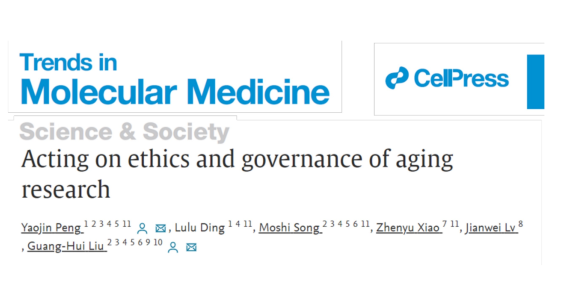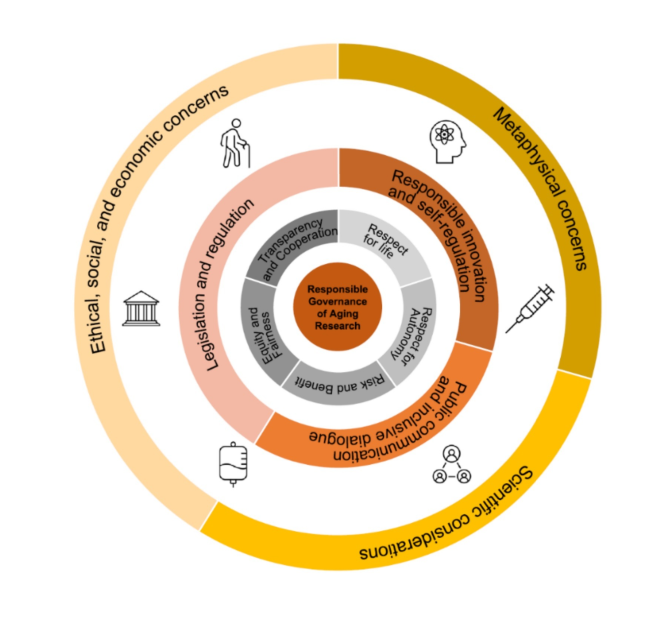In the past 30 years, aging research has made significant progress and has entered a unique new stage. Aging research is evolving from exploring the symptoms of aging to revealing the underlying mechanisms of aging phenotypes, and is beginning to delve into a series of potential aging intervention strategies, such as pharmaceutical intervention, gene therapy, regenerative medicine, immune intervention and active health. Some interventions have already entered clinical trials. In addition, the development of research tools and methods such as genome sequencing and data science has promoted aging research to become one of the important focuses in the biomedical field. The integrated development of human health needs and science and technology are jointly promoting the arrival of a new era of aging research.
Aging research has great potential, and aging intervention technologies and products have been rapidly advanced. However, aging research and clinical translation also face many pressing and thorny social and ethical issues. If these issues cannot be properly addressed in a timely manner, they may lead to unintended institutional and social consequences, thereby hindering the sustainable development of old research fields. Proactive risk assessment, increased transparency and a better governance framework are of great significance to the healthy development of the industry.
On April 27, 2023, Liu Guanghui’s research group at the Institute of Zoology, Chinese Academy of Sciences, and the Institute of Zoology, Chinese Academy of Sciences and Beijing Institute of Stem Cells and Regenerative Medicine "unified "Researcher Peng Yaojin collaborated and published a policy paper titled "Acting on ethics and governance of aging research" online in the magazine Trends in Molecular Medicine. This is a model for the aging research team and the science and technology governance research team to jointly explore the development and ethical governance of cutting-edge science and technology. It is the first time that an ethical governance framework and strategy for aging research has been proposed on an international scale.

Based on their in-depth understanding of aging research, researchers are exploring the development needs of aging research, Based on endogenous driving forces and technological trends, important ethical and social issues are systematically explained from three dimensions: aging research technology itself, philosophical speculation, and specific ethical and social concerns. At the scientific and technological level, especially since aging research is still in its early stages, many scientific issues such as the nature of aging intervention, the optimal period, frequency and applicability of intervention have not yet been fully resolved. These issues will inevitably affect ethics and social considerations. Uncertainty also adds complexity to related ethical and social concerns. Metaphysical issues such as whether extending human lifespan is ethically necessary or acceptable, whether intervening in aging is ethical, and whether aging research challenges the inevitability of aging, etc., are highly controversial and vary depending on cultural, social and religious factors. Specific ethical and social concerns include issues such as special protection of elderly clinical research participants, premature commercialization of aging research technology results, and false and misleading industry propaganda. At the same time, aging interventions may have potential demographic, economic, and sociocultural impacts.

Figure 1 : A framework for ethically responsible governance of aging research
To sum up, this study focuses on ethical and social issues that are often ignored in the field of aging. It is based on the forefront of technological development and has a Conduct an in-depth analysis of existing problems and potential risks in the field, and ultimately build a global governance framework that is balanced, inclusive and targeted, and can be adjusted according to the different conditions of each country and region. Ethical and social considerations related to aging research will become more complex as new technologies emerge, such as organ repair technologies involving nanorobotics and enhanced tissue regeneration, organ manufacturing and transplantation, and genetic and epigenetic interventions. The governance framework developed by the institute is just the beginning. Based on this framework, the researchers hope to encourage experts and scholars in biology, medicine, law, ethics, etc. in the global field of aging research, as well as policymakers, regulators, and the public to pay enough attention to relevant issues and think forward to respond in advance. , thereby promoting high-quality and sustainable development of aging research, which will ultimately benefit human society.
By delving into issues of ethics and governance, this policy paper sets a model for ethical governance in the field of aging science. Globally, this ethical governance framework will help improve social awareness of aging research, promote multidisciplinary and multi-field cooperation and exchanges, and help address ethical and social challenges in aging research and jointly build human health. The community provides support and security.
The research was funded by the Institute of Zoology, Chinese Academy of Sciences, Beijing Institute of Stem Cell and Regenerative Medicine, and Stem Cell and Regenerative Medicine Innovation, Chinese Academy of Sciences. It was completed in cooperation with the Institute, Beijing Institute of Technology, and the China Aging Marker Research Consortium. Liu Guanghui, a researcher at the Institute of Zoology, Chinese Academy of Sciences/Beijing Institute of Stem Cells and Regenerative Medicine, and Peng Yaojin, a researcher at Zhiyi, are the co-corresponding authors of the article. Song Moshi, a researcher at the Institute of Zoology, Chinese Academy of Sciences/Beijing Institute of Stem Cell and Regenerative Medicine, and postdoctoral fellow Ding Lulu, and Professor Xiao Zhenyu from Beijing Institute of Technology are the co-first authors of the article.
Article link: https://www.sciencedirect.com/science/article/pii/S1471491423000643